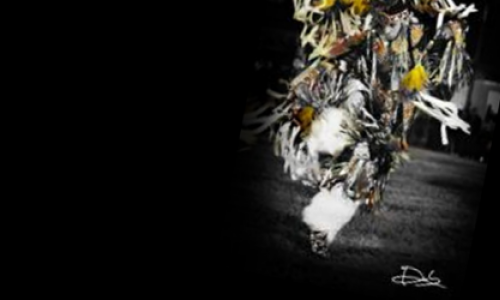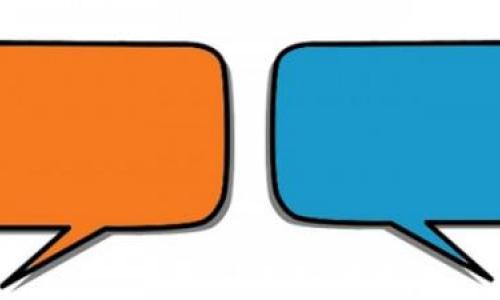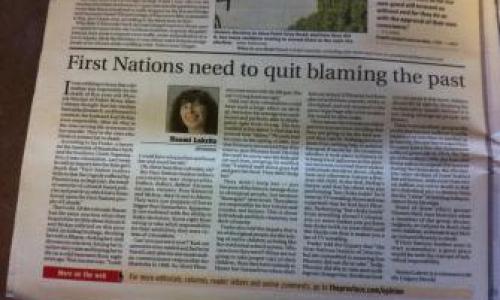
I, like many of you, was fixed to my various social media sites on Thursday as the images and news of the events taking place in New Brunswick against the Mi’kmaq people by the RCMP streamed in. I felt outraged, I felt defiant, and I felt frustrated. I needed to do something, to take some sort of action, so when Friday’s protest rolled around I was more than ready to march my indignant little butt off. And I did, and it was fantastic! I felt relief and a feeling of unity and solidarity with other like-minded people in the world. I felt good knowing that I had supported my Mi’kmaw brothers and sisters and that, that love was now heading out into the universe. I arrived home, posted my pictures and videos and felt a sense of having done the right thing. I could concentrate on my homework and grocery shopping and all of the other things that make up my life.
Then I started thinking…(hate it when that happens)…
I wonder what the opposition would say to me? If I were on the other side of things, what would I say to myself? And I know myself well enough to know that I would say, ‘How can you be so indignant when you create the need for fuel in the first place?!?’
The rally started at 3:30 pm. I stopped in a café to get myself a chai latte, which I drank from a disposable coffee cup and tossed in the garbage when I was finished. The sleeve to the coffee cup fell on the ground as I listened to the speakers before we marched, but there were too many people around me, so I just left it there and conveniently forgot about it. After a couple of hours passed, I bought myself a 700ml bottle of Pepsi and a bag of dill pickle flavoured pumpkin seeds. After three hours of marching I was feeling tired when my friend dropped me off at home, so I didn’t feel like cooking. I drove my Mom’s car to Shoppers Drug Mart to pick up a few things and then to Subway to buy a vegetarian sub for dinner, all within a four-block radius to my house. I spent the rest of the evening on my bed with two laptops in front of me; one for doing homework and checking Facebook, the other for watching NCIS.
I hate to admit it, but this is a true story, (except the NCIS part. I was actually watching episodes of Destination Truth but that sounded kinda dorky.) I’m lazy and I live in a world of convenience. I’ve taught myself to expect quick and easy. I don’t know about you, but quick and easy is never a good thing, no matter what way you look at it. Things that are important, healthy, durable, strong, nutritional, intelligent, nurtured, complex, and worth anything of value take time and effort. We live in a world that is, all the time, telling us to hurry up when the earth itself is telling us to slow down. ‘Hurry up’ is killing the earth and us; perhaps ‘slow down’ will save us.
So after a little self-honesty, I asked myself they ways in which I contribute to the exploitation of Mother Earth. Now I don’t do these all the time, but the truth is, I really shouldn’t be doing it at all.
-
I let the water run to rinse my dishes
-
I wash clothes that aren’t dirty
-
I drive to the corner store
-
I use disposable cups
-
I take paper napkins I don’t need
-
I flush every time
-
I buy fast food and take-out a lot
-
I leave the lights on
-
I leave things I am not using plugged in
-
I open the window when the heat is on
-
I don’t always feel like washing out recyclables, so I throw them in the garbage
These are just a few I came up with off the top of my head. I know there are many more, but I think that it’s important to at least start to think about it. I really don’t want to be one of those people who talks the talk, but doesn’t walk the walk. I know that I will never be perfect and I’m not trying to be; (who needs that kind of pressure?) But I am making smarter choices, conscious choices. Today, I walked to the market and bought fruit and vegetables and I purchased a homemade pumpkin pie from a local bakery. I have recently quit smoking and I am transitioning to a vegetarian diet. There are many small changes I can make, as well as strive toward the bigger changes as I go, remembering always that this is life that I am living and to slow down and live it.
The earth does not need us, as we need her. I am grateful for this life and that I have the opportunity to stand with my brothers and sisters and work toward unity, freedom, justice, solidarity and peace. I also know that this must first start at home and in my heart.
50 Ways To Help the Planet (Taken from an American website, but it applies to all of us)
1. CHANGE YOUR LIGHT If every household in the United State replaced one regular light bulb with one of those new compact fluorescent bulbs, the pollution reduction would be equivalent to removing one million cars from the road.
Don't like the color of light? Use these bulbs for closets, laundry rooms and other places where it won't irk you as much.
2. TURN OFF COMPUTERS AT NIGHT By turning off your computer instead of leaving it in sleep mode, you can save 40 watt-hours per day. That adds up to 4 cents a day, or $14 per year. If you don't want to wait for your computer to start up, set it to turn on automatically a few minutes before you get to work, or boot up while you're pouring your morning cup 'o joe.
3. DON'T RINSE Skip rinsing dishes before using your dishwasher and save up to 20 gallons of water each load. Plus, you're saving time and the energy used to heat the additional water.
4. DO NOT PRE-HEAT THE OVEN Unless you are making bread or pastries of some sort, don't pre-heat the oven. Just turn it on when you put the dish in. Also, when checking on your food, look through the oven window instead of opening the door.
5. RECYCLE GLASS Recycled glass reduces related air pollution by 20 percent and related water pollution by 50 percent. If it isn't recycled it can take a million years to decompose.
6. DIAPER WITH A CONSCIENCE By the time a child is toilet trained, a parent will change between 5,000 and 8,000 diapers, adding up to approximately 3.5 million tons of waste in U.S. landfills each year. Whether you choose cloth or a more environmentally-friendly disposable, you're making a choice that has a much gentler impact on our planet.
7. HANG DRY Get a clothesline or rack to dry your clothes by the air. Your wardrobe will maintain color and fit, and you'll save money.
Your favorite t-shirt will last longer too.
8. GO VEGETARIAN ONCE A WEEK One less meat-based meal a week helps the planet and your diet. For example: It requires 2,500 gallons of water to produce one pound of beef. You will also also save some trees. For each hamburger that originated from animals raised on rainforest land, approximately 55 square feet of forest have been destroyed.
9. WASH IN COLD OR WARM If all the households in the U.S. switched from hot-hot cycle to warm-cold, we could save the energy comparable to 100,000 barrels of oil a day. Only launder when you have a full load.
10. USE ONE LESS PAPER NAPKIN During an average year, an American uses approximately 2,200 napkins—around six each day. If everyone in the U.S. used one less napkin a day, more than a billion pounds of napkins could be saved from landfills each year.
11. USE BOTH SIDES OF PAPER American businesses throw away 21 million tons of paper every year, equal to 175 pounds per office worker. For a quick and easy way to halve this, set your printer's default option to print double-sided (duplex printing). And when you're finished with your documents, don't forget to take them to the recycling bin.
12. RECYCLE NEWSPAPER There are 63 million newspapers printed each day in the U.S. Of these, 44 million, or about 69%, of them will be thrown away. Recycling just the Sunday papers would save more than half a million trees every week.
13. WRAP CREATIVELY You can reuse gift bags, bows and event paper, but you can also make something unique by using old maps, cloth or even newspaper. Flip a paper grocery bag inside out and give your child stamps or markers to create their own wrapping paper that's environmentally friendly and extra special for the recipient.
More ideas: HGTV, Martha, DIY Network
14. RETHINK BOTTLED WATER Nearly 90% of plastic water bottles are not recycled, instead taking thousands of years to decompose. Buy a reusable container and fill it with tap water, a great choice for the environment, your wallet, and possibly your health. The EPA's standards for tap water are more stringent than the FDA's standards for bottled water.
15. BAN BATHTIME ! Have a no-bath week, and take showers instead. Baths require almost twice as much water. Not only will you reduce water consumption, but the energy costs associated with heating the water.
16. BRUSH WITHOUT RUNNING You've heard this one before, but maybe you still do it. You'll conserve up to five gallons per day if you stop. Daily savings in the U.S. alone could add up to 1.5 billion gallons--more water than folks use in the Big Apple.
17. SHOWER WITH YOUR PARTNER Sneak in a shower with your loved one to start the day with some zest that doesn't come in a bar. Not only have you made a wise choice for the environment, but you may notice some other added...um...benefits.
18. TAKE A SHORTER SHOWER Every two minutes you save on your shower can conserve more than ten gallons of water. If everyone in the country saved just one gallon from their daily shower, over the course of the year it would equal twice the amount of freshwater withdrawn from the Great Lakes every day.
19. PLANT A TREE It's good for the air, the land, can shade your house and save on cooling (plant on the west side of your home), and they can also improve the value of your property.
Make it meaningful for the whole family and plant a tree every year for each member.
20. USE YOUR CRUISE CONTROL You paid for those extra buttons in your car, so put them to work! When using cruise control your vehicle could get up to 15% better mileage. Considering today's gasoline prices, this is a boon not only for the environment but your budget as well.
21. SECOND-HAND DOESN'T MEAN SECOND-BEST Consider buying items from a second-hand store. Toys, bicycles, roller blades, and other age and size-specific items are quickly outgrown. Second hand stores often sell these items in excellent condition since they are used for such a short period of time, and will generally buy them back when you no longer need them.
22. BUY LOCAL Consider the amount of pollution created to get your food from the farm to your table. Whenever possible, buy from local farmers or farmers' markets, supporting your local economy and reducing the amount of greenhouse gas created when products are flown or trucked in.
23. ADJUST YOUR THERMOSTAT Adjust your thermostat one degree higher in the summer and one degree cooler in the winter. Each degree celsius less will save about 10% on your energy use! In addition, invest in a programmable thermostat which allows you to regulate temperature based on the times you are at home or away.
24. INVEST IN YOUR OWN COFFEE CUP If you start every morning with a steamy cup, a quick tabulation can show you that the waste is piling up. Invest in a reusable cup, which not only cuts down on waste, but keeps your beverage hot for a much longer time. Most coffee shops will happily fill your own cup, and many even offer you a discount in exchange!
25. BATCH ERRANDS Feel like you spend your whole week trying to catch up with the errands? Take a few moments once a week to make a list of all the errands that need to get done, and see if you can batch them into one trip. Not only will you be saving gasoline, but you might find yourself with much better time-management skills.
26. TURN OFF LIGHTS Always turn off incandescent bulbs when you leave a room. Fluorescent bulbs are more affected by the number of times it is switched on and off, so turn them off when you leave a room for 15 minutes or more. You'll save energy on the bulb itself, but also on cooling costs, as lights contribute heat to a room.
27. GREENER LAWN CARE If you must water your lawn, do it early in the morning before any moisture is lost to evaporation. Have a few weeds? Spot treat them with vinegar. Not sure if you should rake? Normal clippings act as a natural fertilizer, let them be. If you've waited too long, rake by hand — it's excellent exercise.
28. PICNIC WITH A MARKER Some time in between the artichoke dip and the coleslaw, you lost track of your cup, and now there are a sea of matching cups on the table, one of which might be yours. The next time you picnic, set out permanent marker next to disposable dinnerware so guests can mark their cup and everyone will only use one.
29. RECYCLE OLD CELL PHONES The average cell phone lasts around 18 months, which means 130 million phones will be retired each year. If they go into landfills, the phones and their batteries introduce toxic substances into our environment. There are plenty of reputable programs where you can recycle your phone, many which benefit noble causes.
30. MAINTAIN YOUR VEHICLE Not only are you extending the life of your vehicle, but you are creating less pollution and saving gas. A properly maintained vehicle, clean air filters, and inflated tires can greatly improve your vehicle's performance. And it might not hurt to clean out the trunk—all that extra weight could be costing you at the pump.
31. RECYCLE UNWANTED WIRE HANGERS Wire hangers are generally made of steel, which is often not accepted by some recycling programs. So what do you do with them? Most dry cleaners will accept them back to reuse or recycle. (Cue Joan Crawford.)
32. RECYCLE ALUMINUM AND GLASS Twenty recycled aluminium cans can be made with the energy it takes to manufacture one brand new one.
Every ton of glass recycled saves the equivalent of nine gallons of fuel oil needed to make glass from virgin materials.
33. TELECOMMUTE See if you can work out an arrangement with your employer that you work from home for some portion of the week. Not only will you save money and gasoline, and you get to work in your pajamas!
34. KEEP YOUR FIREPLACE DAMPER CLOSED Keeping the damper open (when you're not using your fireplace) is like keeping a 48-inch window wide open during the winter; it allows warm air to go right up the chimney. This can add up to hundreds of dollars each winter in energy loss.
35. CUT DOWN ON JUNK MAIL Feel like you need to lose a few pounds? It might be your junk mail that's weighing you down. The average American receives 40 pounds of junk mail each year, destroying 100 millions trees. There are many services that can help reduce the clutter in your mailbox, saving trees and the precious space on your countertops.
36. CHOOSE MATCHES OVER LIGHTERS Most lighters are made out of plastic and filled with butane fuel, both petroleum products. Since most lighters are considered "disposable," over 1.5 billion end up in landfills each year. When choosing matches, pick cardboard over wood. Wood matches come from trees, whereas most cardboard matches are made from recycled paper.
37. LET YOUR FINGERS DO THE WALKING—ONLINE Consider if you really need a paper phone book. If not, call to stop phone book delivery and use an online directory instead. Some estimate that telephone books make up almost ten percent of waste at dump sites. And if you still receive the book, don't forget to recycle your old volumes.
38. GIVE IT AWAY Before you throw something away, think about if someone else might need it. Either donate to a charitable organization or post it on a web site designed to connect people and things, such as Freecycle.org.
39. GO TO A CAR WASH Professional car washes are often more efficient with water consumption. If everyone in the U.S. who washes their car themselves took just one visit to the car wash we could save nearly 8.7 billion gallons of water.
40. PLASTIC BAGS SUCK Each year the U.S. uses 84 billion plastic bags, a significant portion of the 500 billion used worldwide. They are not biodegradable, and are making their way into our oceans, and subsequently, the food chain. Stronger, reusable bags are an inexpensive and readily available option.
41. FLY WITH AN E-TICKET The cost of processing a paper ticket is approximately $10, while processing an e-ticket costs only $1. In the near future, e-tickets will be the only option, saving the airline industry $3 billion a year. In addition to financial savings, the sheer amount of paper eliminated by this process is commendable.
42. DOWNLOAD YOUR SOFTWARE Most software comes on a compact disc, and more than thirty billion compact discs of all types are sold annually. That's a huge amount of waste, not to mention the associated packaging. Another bonus to downloading your software is that it's often available for download at a later date when you upgrade to a new computer or are attempting to recover from a crash.
43. STOP YOUR ANSWERING MACHINE Answering machines use energy 24 hours a day, seven days a week. And when they break, they're just one more thing that goes into the landfill. If all answering machines in U.S. homes were eventually replaced by voice mail services, the annual energy savings would total nearly two billion kilowatt-hours.
44. SKIP THE COFFEE STIRRER Each year, Americans throw away 138 billion straws and stirrers. But skipping the stirrer doesn't mean drinking your coffee black. Simply put your sugar and cream in first, and then pour in the coffee, and it should be well mixed.
Determined to stir? Break off a piece of pasta from the cupboard. You can nibble after using it, compost, or throw away with less guilt.
45. FIND A BETTER WAY TO BREAK THE ICE When a big winter storm heads our way, most of us use some sort of ice melter to treat steps and sidewalks. While this makes the sidewalks safer for people, it may pose a hazard for pets who might ingest these products. Rock salt and salt-based ice-melting products can cause health problems as well as contaminate wells and drinking water. Look for a pet-safe deicer, readily available in many stores.
46. USE COTTON SWABS WITH A PAPERBOARD SPINDLE Some brands of cotton swabs have a paperboard spindle while others are made of plastic. If 10% of U.S. households switched to a paperboard spindle, the petroleum energy saved per year would be equivalent to over 150,000 gallons of gasoline.
47. PAY BILLS ONLINE By some estimates, if all households in the U.S. paid their bills online and received electronic statements instead of paper, we'd save 18.5 million trees every year, 2.2 billion tons of carbon dioxide and other greenhouse gases, and 1.7 billion pounds of solid waste.
48. STOP PAPER BANK STATEMENTS Some banks will pay you a dollar or donate money on your behalf when you cancel the monthly paper statements you get in the mail. If every household took advantage of online bank statements, the money saved could send more than seventeen thousand recent high school graduates to a public university for a year.
49. USE RECHARGABLE BATTERIES Each year 15 billion batteries produced and sold and most of them are disposable alkaline batteries. Only a fraction of those are recycled. Buy a charger and a few sets of rechargeable batteries. Although it requires an upfront investment, it is one that should pay off in no time. And on Christmas morning when all the stores are closed? You'll be fully stocked.
50. SHARE! Take what you've learned, and pass the knowledge on to others. If every person you know could take one small step toward being greener, the collective effort could be phenomenal.















